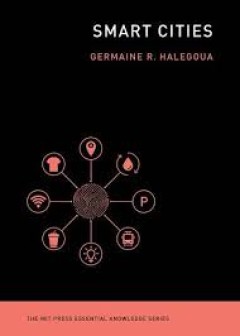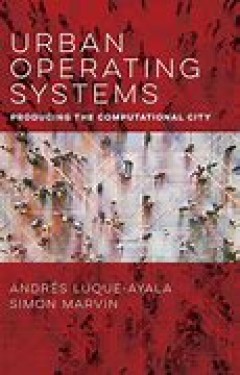Filter by

Smart Cities
Key concepts, definitions, examples, and historical contexts for understanding smart cities, along with discussions of both drawbacks and benefits of this approach to urban problems. Over the past ten years, urban planners, technology companies, and governments have promoted smart cities with a somewhat utopian vision of urban life made knowable and manageable through data collection and analys…
- Edition
- -
- ISBN/ISSN
- 9780262356848
- Collation
- 1 online resource (248 pages).
- Series Title
- -
- Call Number
- -

Urban Operating Systems: Producing the Computational City
"Urban OS critically examines the modest potentials and serious contradictions of reconfiguring urban life, city services, and urban networked infrastructure through computational operating systems"--OCLC-licensed vendor bibliographic record.
- Edition
- -
- ISBN/ISSN
- 9780262360982
- Collation
- 1 online resource.
- Series Title
- -
- Call Number
- -

Cryptographic city :decoding the smart metropolis
"Coyne examines urban living through the frame of cryptography, diving into the technologies, instruments, and processes of hiding information, messages, things, spaces, places, and people within cities"--OCLC-licensed vendor bibliographic record.
- Edition
- -
- ISBN/ISSN
- 9780262374828
- Collation
- 1 online resource
- Series Title
- -
- Call Number
- -

The computable city :histories, technologies, stories, predictions
"A history of how computers are being used to simulate cities which in turn are increasingly being built from those same computers which are being embedded into the city's social and economic fabric"--OCLC-licensed vendor bibliographic record.
- Edition
- -
- ISBN/ISSN
- 9780262377850
- Collation
- 1 online resource
- Series Title
- -
- Call Number
- -

The smart enough city :putting technology in Its place to reclaim our urban f…
Why technology is not an end in itself, and how cities can be "smart enough," using technology to promote democracy and equity. Smart cities, where technology is used to solve every problem, are hailed as futuristic urban utopias. We are promised that apps, algorithms, and artificial intelligence will relieve congestion, restore democracy, prevent crime, and improve public services. In The Smar…
- Edition
- -
- ISBN/ISSN
- 9780262352246
- Collation
- 1 online resource (240 pages) :illustrations.
- Series Title
- -
- Call Number
- -
 Computer Science, Information & General Works
Computer Science, Information & General Works  Philosophy & Psychology
Philosophy & Psychology  Religion
Religion  Social Sciences
Social Sciences  Language
Language  Pure Science
Pure Science  Applied Sciences
Applied Sciences  Art & Recreation
Art & Recreation  Literature
Literature  History & Geography
History & Geography